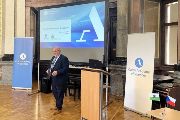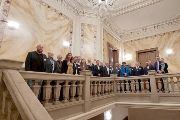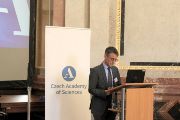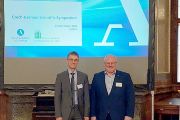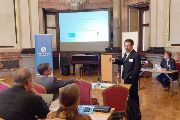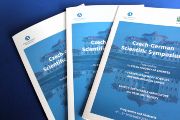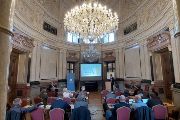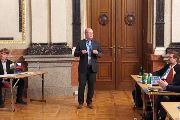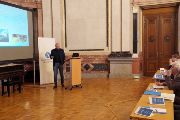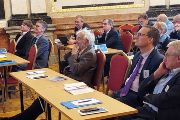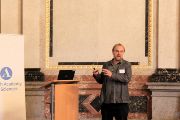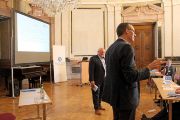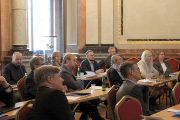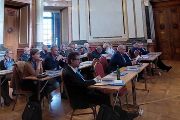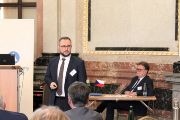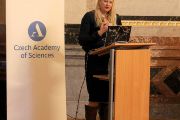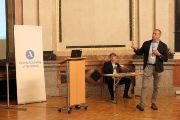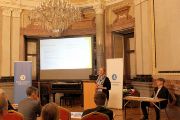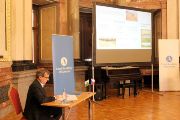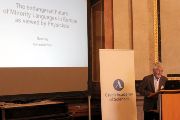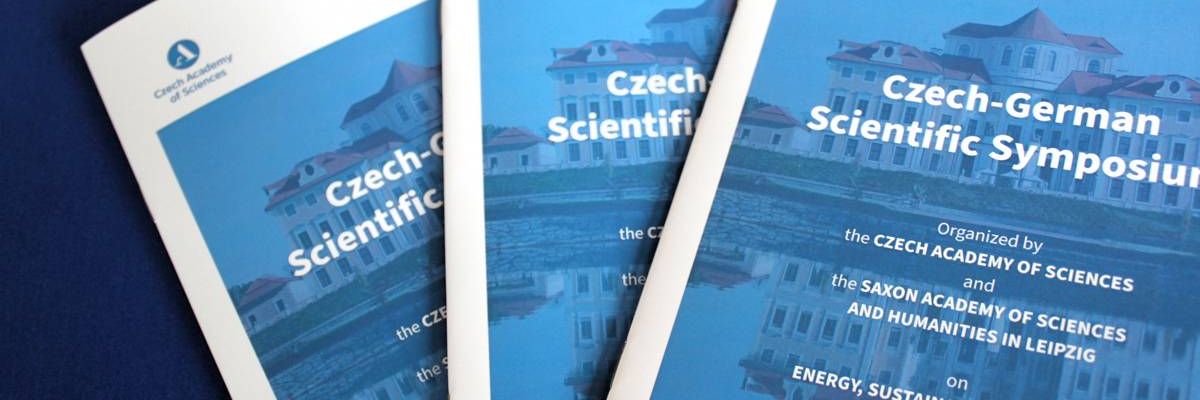
Czech and Saxon Academies of Sciences to strengthen cooperation on key issues
06. 11. 2024
In recent years, scientific knowledge has grown increasingly important as we face more and more societal challenges – and not only in Europe. Key topics such as energy, sustainable agriculture, and the resilience of our society were the focus of a Czech–German symposium of the Czech Academy of Sciences (CAS) and the Saxon Academy of Sciences and Humanities, held at the CAS Conference Center in Liblice on 4–5 November 2024.
The conference at Liblice Château was the first of a series of joint events agreed upon by the CAS and the Saxon Academy of Sciences (Sächsische Akademie der Wissenschaften zu Leipzig – SAW) in a memorandum signed in 2023. CAS President Eva Zažímalová noted that this memorandum has paved the way for a long-term partnership: “Our intention was to promote an exchange of knowledge, especially on pressing issues such as energy, sustainable agriculture, and resilient societies. We firmly believe the memorandum will serve as a platform for deepening and broadening cooperation with our cross-border partner, and that it will lead to successful projects that benefit both sides across all fields of science,” she said, adding that this is a key step toward strengthening scientific ties between institutions and regions.
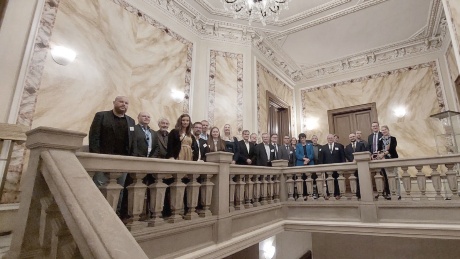
Participants of the Czech–German symposium at the CAS Conference Center in Liblice.
“We must be able to ensure adequate food supplies and sustainable energy for a society that is to be confident, self-sufficient, and competitive – and thus resilient to the crises Europe will face,” Zažímalová continued. Sharing and exchanging knowledge and experience in these key areas with a renowned scientific partner institution will make it possible to more effectively address global challenges, contributing to sustainable societal development.
Transcending borders
“Saxony and the Czech Republic share a long and vibrant history, as is natural for close neighbors,” highlighted David Honys, Chair of the Council for International Affairs and member of the Academy Council of the CAS, at the symposium’s opening. He gave an example of several instances from shared political and cultural history, expressing hope that experts from both sides of the border that met in Liblice would find new work partners to support further cooperation between the two institutions and regions. “Our presence in the European Research Area is not insignificant. Without fostering ties with foreign colleagues, however, Czech science would advance more slowly,” Honys added.
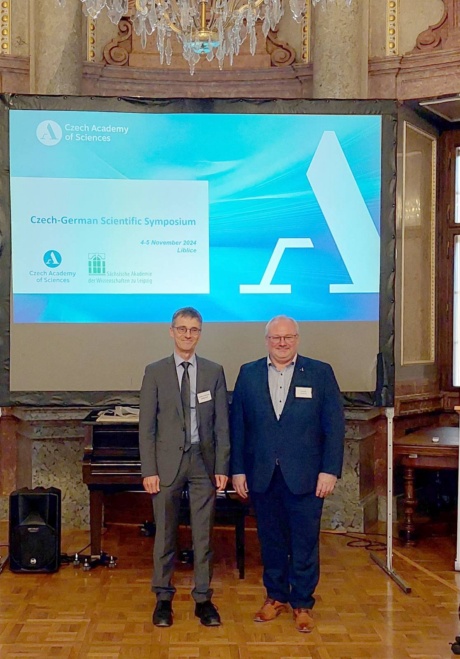
President of the Saxon Academy of Sciences, Hans-Joachim Knölker, and Chair of the Council for International Affairs and member of the Academy Council of the CAS, David Honys, who opened the symposium on behalf of the CAS.
Hans-Joachim Knölker, President of the Saxon Academy of Sciences, also emphasized the importance of international cooperation and the connection between Czech and German scientists, noting that the 2024 symposium marks the beginning of an important partnership. “The scientific standard of both institutions is highly regarded not only in Europe but worldwide. That is why I am pleased we can work together on issues that are in the public interest in both Germany and the Czech Republic,” Knölker noted.
Knölker’s words were echoed by Jiří Plešek from the Academy Council of the CAS, who is responsible for coordinating and developing the CAS Strategy AV21. According to him, the Strategy AV21 research programs support activities that focus primarily on the public interest. “They arise from a synergy of various fields and sectors and are directed at research that responds to current issues. Our scientists’ expertise will certainly be applied in projects with the Saxon Academy of Sciences as well,” Plešek explained.
The CAS is well-equipped to advance all three of these priority topics. For several years, it has already been responding to the “demand” for solutions based on scientific expertise by means of Strategy AV21 programs under the motto “Top research in the public interest.”
Current challenges, new insights
Over the two-day event in Liblice, 14 scientists presented their research and projects. CAS experts specializing in one of the three key topics represented the Academy at the symposium.
For instance, Miroslav Chomát, director of the Institute of Thermomechanics of the CAS, spoke about the Strategy AV21 program, Sustainable Energy. He highlighted the fact that it covers key areas associated with the transition to sustainable energy. For example, in nuclear energy, we must seek new solutions for thermonuclear fusion and ensure the safety of nuclear power plants with fission reactors. “The variability in renewable energy production and the gradual decentralization of production are creating a demand for energy storage. Hydrogen could play a major role in the future as a primary energy source for transportation,” Chomát noted.
In the past two centuries, significant breakthroughs have been made in the understanding and application of our knowledge in genetics. With the development of methods like TALEN and CRISPR-Cas, which enable active genome modification, scientists have reached a certain pinnacle in this field.
Today, genome-editing techniques can be pivotal tools in breeding practices. But these are not the only methods categorized under new breeding techniques. Roman Hobza from the Institute of Biophysics of the CAS presented on this topic, stressing that it is crucial to bridge basic research and practical applications. “Numerous barriers may hinder the smooth application of research findings in practice – especially those related to legislation, media portrayal, and public understanding. Multinational corporations also play a major role in setting the rules for what is feasible,” he added.
Lenka Bartošová from the Global Change Research Institute of the CAS introduced web portals that provide information to the public or specific recipients like farmers: “For instance, the INTERSUCHO portal provides data on drought occurrence and duration, focusing mainly on soil saturation, while the AGRORISK site is tailored to the agricultural sector,” Bartošová explained. All these activities are part of the Strategy AV21 program, Food for the Future.
The topic of resilience is also gaining importance, with the Strategy AV21 program Resilient Society addressing this issue. Resilience refers to a system’s ability to successfully – or even adaptively – cope with crises, unexpected emergencies or jeopardizing events, or changing living conditions. Martin Nitsche from the Institute of Philosophy of the CAS presented a project that examines and tests in practice the systemic assumptions, resources, and tools for social resilience to crises in the specific area of Ralsko. “During the 20th and 21st centuries, this region has undergone fundamental changes and continues to face socio-cultural, environmental, and economic crises,” Nitsche explained, showcasing how multisystem resilience can be applied to the social circumstances of this area and how local conditions shape this approach to resilience.
See you next year!
The symposium both offered new insights and demonstrated the importance of combining strengths in research. The cooperation between the CAS and the Saxon Academy of Sciences thus has the potential to benefit not only scientists, but European society as a whole, which can always reap the rewards of scientific advancements.
“I hope that our partnership will continue not only at the institutional level but that, thanks to the Liblice symposium, it will extend to CAS institutes, universities, and research institutions my colleagues from the Saxon Academy of Sciences are affiliated with. I look forward to our joint projects – and we will see you next year in Leipzig,” Knölker concluded.
Prepared by: Julie Smilnická, Division of International Cooperation, CAS Head Office, and Luděk Svoboda, External Relations Division, CAO of the CAS
Translated by: Tereza Novická, External Relations Division, CAO of the CAS
Photo: Division of International Cooperation, CAS Head Office
 The text and photos are released for use under the Creative Commons license.
The text and photos are released for use under the Creative Commons license.
Read also
- A trapped state: The pandemic impact on public attitudes, trust, and behavior
- Aerial archaeology: Tracing the footsteps of our ancestors from the sky
- Archaeologists uncover ancient finds along Prague Ring Road
- Our microbiome largely depends on what we eat, says microbiologist Michal Kraus
- The ABCs of writing: Why did its invention mark a turning point for humankind?
- We learn, remember, forget… What can memory actually do? And can we outsmart it?
- New Center for Electron Microscopy in Brno opens its doors to global science
- The hidden lives of waste: What can we learn from waste workers and pickers?
- A unique lab is hidden right beneath Prague’s Vítkov Hill
- Renewables are a strategic investment in European security, scientists say
The Czech Academy of Sciences (the CAS)
The mission of the CAS
The primary mission of the CAS is to conduct research in a broad spectrum of natural, technical and social sciences as well as humanities. This research aims to advance progress of scientific knowledge at the international level, considering, however, the specific needs of the Czech society and the national culture.
President of the CAS
Prof. Eva Zažímalová has started her second term of office in May 2021. She is a respected scientist, and a Professor of Plant Anatomy and Physiology.
She is also a part of GCSA of the EU.
